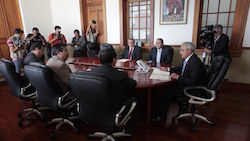Guatemala’s president has announced that he will seek to renew the mandate of a United Nations-backed anti-impunity body, extending the lifespan of a controversial effort that, despite several important achievements, has proved unable to sufficiently reform the country’s judicial system.
During an April 23 press conference, Guatemalan President Otto Perez Molina announced that he would ask the United Nations for a two-year extension for the International Commission against Impunity in Guatemala (CICIG), reported Siglo21.
“I am convinced and hopeful that it will be for the good of Guatemala,” Perez stated at the press conference, adding that his decision was a response to “the clamor of Guatemalans for more security and justice.”
Perez’s decision came two days after a national panel, charged with assessing the CICIG, handed over its recommendations.
The panel — which was created in February and included representatives from the offices of the Attorney General, Ministry of Government, and Supreme Court — reportedly made five recommendations, the first of which was to extend the mandate.
Supreme Court President Felipe Baquiax said the panel had unanimously concluded that Otto Perez should renew the CICIG’s mandate until 2017 for several reasons, including the quality of the CICIG’s work and Guatemala’s inability to investigate and dismantle criminal structures on its own.
The request for the CICIG’s extension must be formally presented in September and approved by the UN General Assembly.
The CICIG’s mandate has been extended on three prior occasions, in 2009, 2011, and 2013.
Previous remarks by President Perez had strongly implied that the CICIG’s days were numbered. Perez said that the CICIG’s time was “coming to and end” and that he would not bow to international pressure — a reference to US Vice President Joe Biden’s support for extending the CICIG’s term.
InSight Crime Analysis
The CICIG has operated in Guatemala since 2007 (see timeline below) with the goal of helping to combat impunity and dismantle so-called “parallel” criminal networks in the country.
To that end, its work has resulted in some positive steps towards promoting justice and combating corruption in Guatemala, with CICIG investigations leading to trials against an ex-president, a police chief, and a former defense minister, among others.
In what may have been its hallmark moment in January 2010, it resolved the murder of Rodrigo Rosenberg, a prominent lawyer who had — the commission found via an elaborate and complicated investigation — engineered his own assassination in order to destabilize the government.
But its most recent work may have been its most impressive. Perhaps pressed by the possibility of being ousted, the commission put together a case last year against one of the most notorious criminals in Guatemala, Byron Lima, who ran an extortion ring from his prison cell with the help of the head of the prison system. And in recent days, the commission unveiled a case that connected Vice President Roxana Baldetti’s private secretary with a customs fraud ring.
SEE ALSO: Guatemala News and Profiles
But while the CICIG can undoubtedly take credit for a handful of landmark cases against public officials — which has earned the commission widespread support outside of Guatemala, and particularly in Washington DC — ultimately, the CICIG has not proved to be the solution to Guatemala’s rampant corruption and security problems.
Indeed, as initially envisioned, the CICIG was charged with implementing more long-term structural changes, such as training police and Guatemalan prosecutors to more effectively perform their jobs. Yet after eight years in Guatemala and with significant investment (CICIG’s budget is about $12 million per year), the CICIG is still struggling to transfer its know-how and foster an independent judicial system.
The CICIG should not, ultimately, be judged on whether it has made landmark cases, but whether it has helped create a strong enough judicial system that its presence is not even needed.
SEE ALSO: Coverage of Judicial Reform
This was not the reason Perez made his decision to keep the commission. Strong internal and external pressures, most notably from the United States — which is in the process of formulating a large aid package for Central America — likely forced the president’s hand.
But now that the commission has more time — and political space — it should focus on the real task at hand: getting the Guatemalan justice system to work on its own.
Ultimately, the CICIG’s success needs to be judged not on its high profile cases but on its ability to make itself redundant in the fight against corruption and impunity in Guatemala. Until that happens, let’s hold the applause.
*The research presented in this article is, in part, the result of a project funded by Canada’s International Development Research Centre (IDRC). Its content is not necessarily a reflection of the positions of the IDRC. The ideas, thoughts and opinions contained in this document are those of the author or authors.


